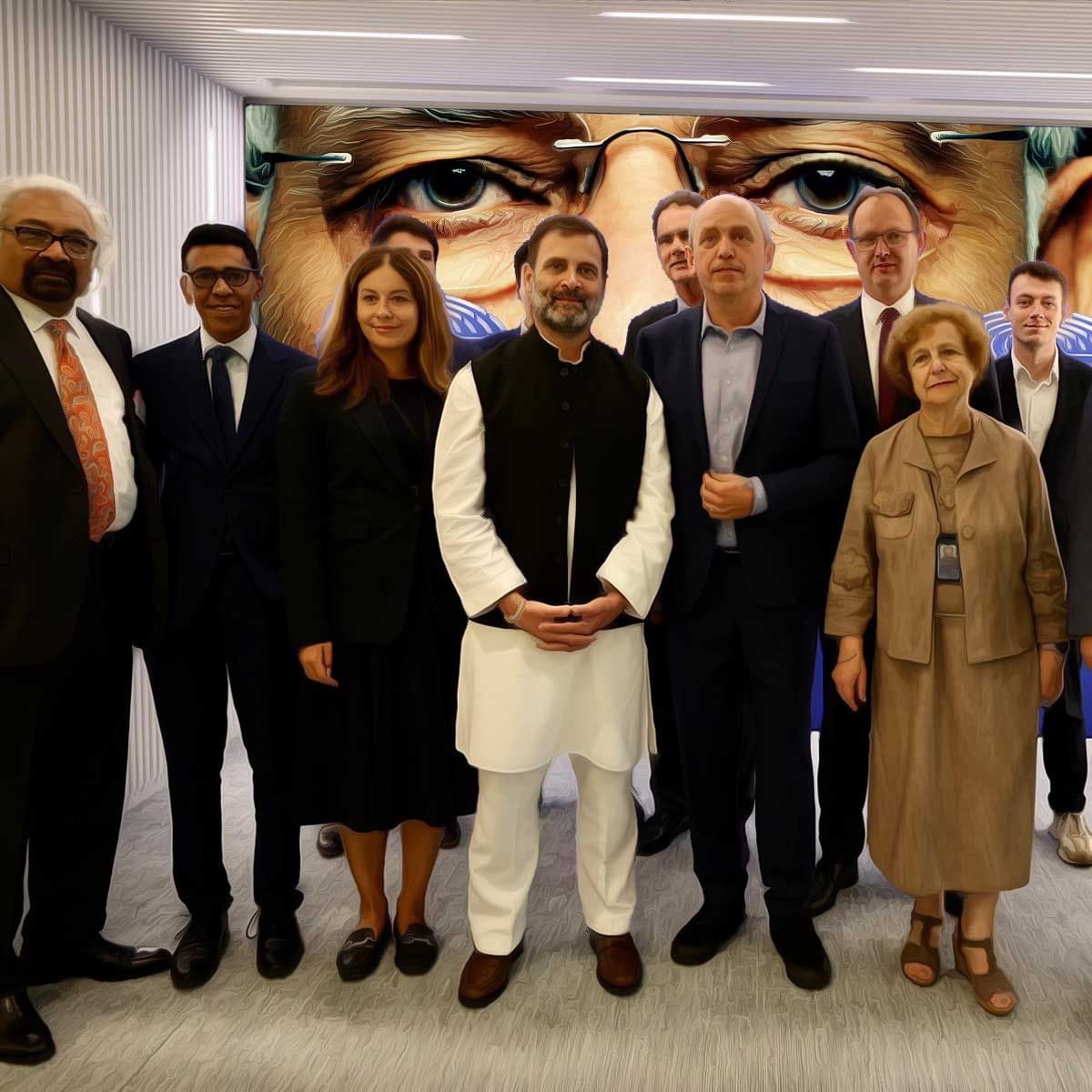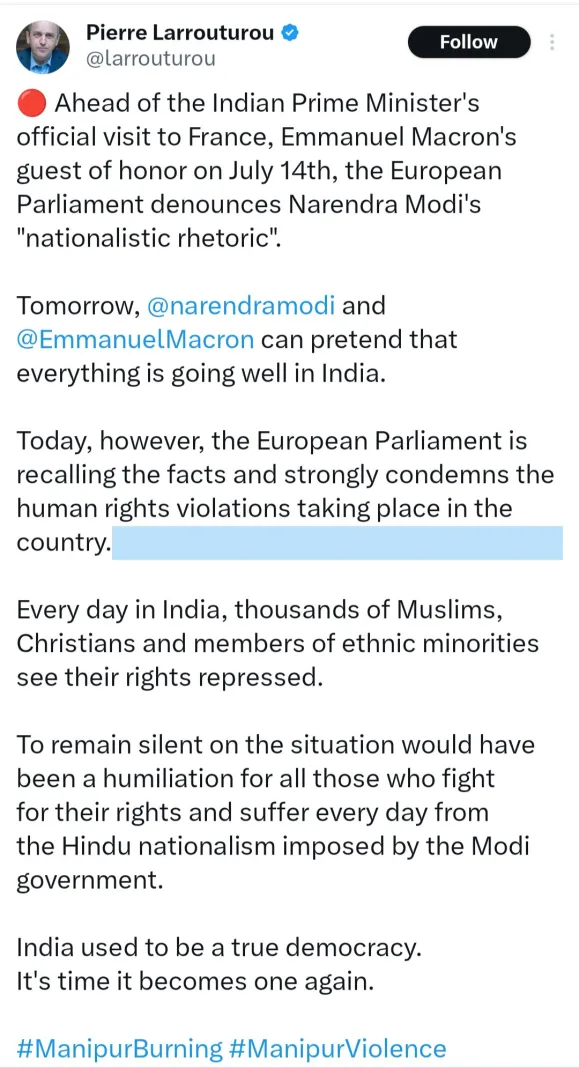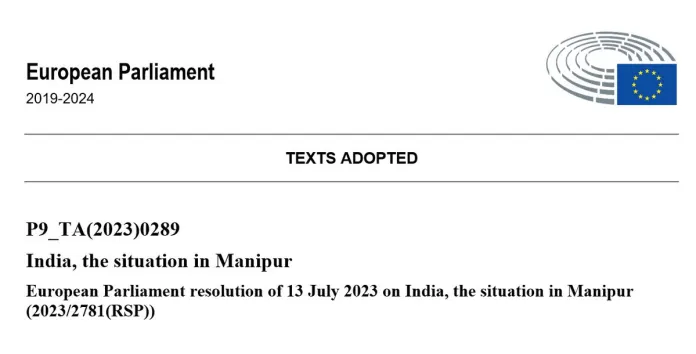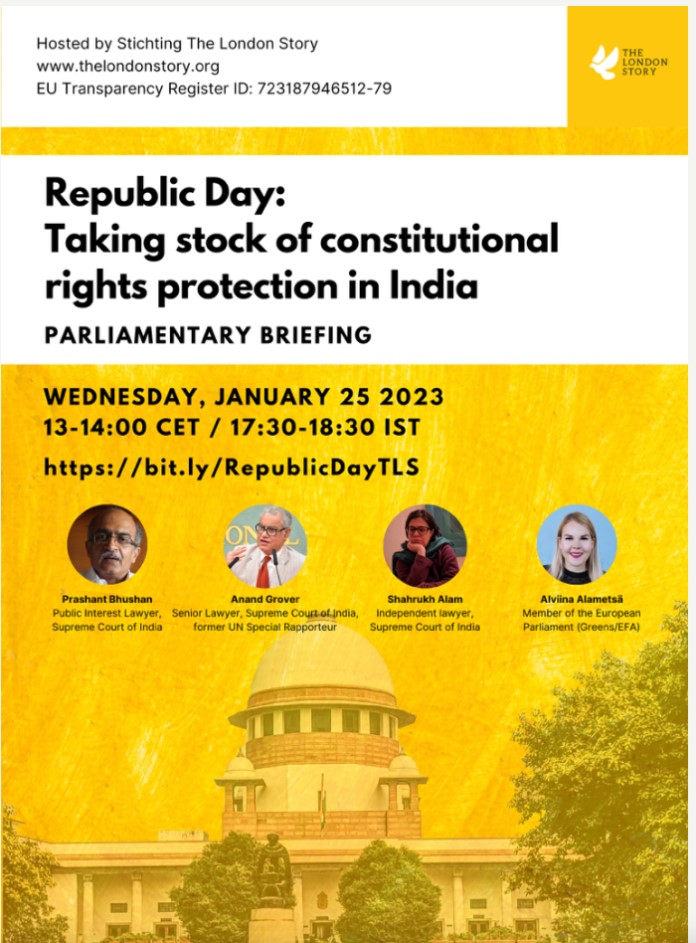More Coverage
Twitter Coverage
Satyaagrah
Written on
Satyaagrah
Written on
Satyaagrah
Written on
Satyaagrah
Written on
Satyaagrah
Written on
JOIN SATYAAGRAH SOCIAL MEDIA
Brussels Chronicles: Rahul Gandhi started another of his frequent ‘foreign tours’ yesterday, a habitual tryst with anti-India lobbyists, nurturing alliances that threaten to erode India's sovereign narrative. A quest for power, or a misaligned crusade?

In a move that is growing tiresomely predictable, Rahul Gandhi, the Congress MP, seems to have developed a knack for seeking out and aligning with figures and groups that hold an anti-India stance, especially during his frequent overseas jaunts. Yes, once again, Gandhi has left Indian soil only to immerse himself in the company of those who seemingly want to interfere in India's domestic matters, undermining the sovereignty and pride of the nation he hails from.
|
In a recent venture that can only be described as an audacious escapade, Gandhi embarked on yet another 'foreign tour', which kicked off in Brussels, the pulsating heart of Belgium, and the very nerve centre of the European Union. A city that intertwines the modern hustle and bustle with rich history, now witnesses Gandhi mingling with individuals who seem less than enthusiastic about India's progress on the global stage.
As per the schedule released on September 7th by the Indian Overseas Congress, the self-proclaimed Congress prince had an itinerary packed to the brim with engagements designed to foster connections with those who have previously been behind resolutions criticizing India. The schedule vividly detailed an afternoon meeting with EU parliamentarians, a rendezvous with the 'civil society' in the evening, followed by a press conference, and capped off with a 'diaspora meet' to perhaps weave narratives that stray far from India's national interests.
|
And let's not forget, this is just the beginning of a meticulously planned tour, with the Congress leader set to grace Paris, France on the 8th and 9th of September, followed by a jaunt to The Hague, Netherlands on the 10th and 11th of September, before culminating his seemingly agenda-driven trip in Oslo, Norway, from the 11th to the 12th of September.
While in Brussels, it wasn't just any EU parliamentarians that Gandhi decided to confer with, but individuals such as Alviina Alametsa and Pierre Larrouturou, figures who have notably taken stands opposing Indian interests in the past. These engagements were not held in secrecy, as images were brazenly shared where Gandhi, accompanied by Sam Pitroda, were visibly engrossed in discussions with the MEPs.
As we delve deeper into this narrative, it becomes increasingly clear that the very essence of these meetings reverberate with undertones of seeking alliances that might not align with the flourishing trajectory that India envisages. It appears that Gandhi is fostering relationships with figures who seemingly carry a tune that is far removed from the symphony of growth and unity that India is currently orchestrating on the world stage.
|
Who are Alviina Alametsa and Pierre Larrouturou?
First in line is MEP Pierre Larrouturou, an individual who has not shied away from vocalizing his disdain for the Indian government led by PM Modi. In a display of open admiration and solidarity, Larrouturou enthusiastically took to social media to share glimpses of his rendezvous with Rahul Gandhi, whom he lauded as a 'great figure of Indian democracy'. But what might seem as mere pleasantries exchanged between politicians, is heavily laden with undertones of a brewing alliance against India's current governmental stance.
On the social platform 'X', Larrouturou's words rang loud and clear as he expressed being "very honored" to welcome Gandhi to the European Parliament. His praise for Gandhi as a stalwart fighting against the so-called 'ultra-nationalism' of the Modi government seemed to resonate with a narrative that has been often peddled by certain groups. The meeting, which boasted participation from MEPs across 7 different factions, apparently revolved around discussions concerning human rights, social justice, and climate change - topics that have been at the heart of many debates globally.
|
However, it is pivotal to note that Larrouturou is not just another MEP. He was a linchpin in orchestrating the anti-India resolution that sailed through the EU Parliament this July, addressing the Manipur issue. His stance became unequivocally clear when, in a relentless social media barrage, he revealed that the timing of the EU resolution was meticulously planned to coincide with PM Modi's official visit to France, a move which many perceive as a direct affront to India's diplomatic relations and global standing.
As we venture further into this exposé, we cannot overlook the potentially volatile alliances that seem to be fostering under the guise of casual diplomatic meetings. The praise showered upon Gandhi, coupled with Larrouturou's historical antagonistic stance towards the Modi government, paints a picture that could be seen as a blatant mockery of India's democratic fabric and sovereignty.
On the 12th of July 2023, the plenary session of the EU parliament held in Strasbourg emerged as a stage where grave allegations and debates concerning Manipur were unleashed, alarmingly just before Indian Prime Minister Narendra Modi's anticipated state visit to France. The visit was upon an invitation by the French President Emmanuel Macron, with Modi gracing the occasion as the Guest of Honour at the prestigious Bastille Day Parade. However, lurking in the background was a discussion scheduled under the ominous title, ‘Debates on cases of breaches of human rights, democracy, and the Rule of Law’, spearheaded predominantly by Pierre Larrouturou, a representative of the Progressive Alliance of Socialists and Democrats in the European Parliament.
With no holds barred, Larrouturou took a prominent role in proposing a resolution that scrutinized the situation in Manipur, an explicit venture into the internal affairs of the Indian state. A move so blatant, it reeked of a calculated agenda to mar the diplomatic ties during a significant international collaboration.
The Indian government, however, stood tall and unyielding against these accusations and perceived interferences. Responding with a vehement dismissal of the resolution, India exhibited its unwavering stand against any attempts to infiltrate its sovereign decisions and internal affairs. The Ministry of External Affairs (MEA) was unequivocal in its stance, essentially urging the EU parliament to focus on its internal matters instead of dabbling in India's affairs. The strong-worded statement released on July 13 was a testament to India's resolve to safeguard its autonomy, suggesting that the EU Parliament would do well to "mind their own business" and concentrate on their internal dilemmas.
 |
| Pierre Larrouturou before PM Modi’s France visit |
 |
| image via @ClaFrancavilla on X |
Yet, the chain of events does not end here. Adding another facet to this complex narrative is the involvement of Alviina Alametsa, another notable figure in this unfolding drama. A figure who has found herself amidst staunch anti-India campaigns in Europe, Alametsa's connections run deep into a network of individuals and groups notorious for their adverse stands against India. To put this into perspective, earlier in January, Alametsa was seen actively participating in discussions alongside Prashant Bhushan and Shahrukh Alam. These discussions were facilitated by 'The London Story', an entity whose alleged affiliations with the ISI have raised numerous eyebrows.
As we focus our lens on Alviina Alametsa's conspicuous activities that seem meticulously choreographed to undermine India's sovereignty, further fanning the flames of controversy and discord. It seems that the stage was perfectly set for Alametsa to amplify her discordant notes against India, which are unfortunately ringing loud in the European corridors.
This July, during the EU plenary session, Alametsa made bold assertions that not only questioned the current state of human rights and press freedom in India but went a step further in calling for international interference in India's internal affairs. An audacious move, some would say, as she stressed on allowing external observers into Manipur to 'monitor' the ongoing situation, advocating for what she referred to as a peaceful resolution.
 |
| Alvinna Almetsa’s event in India ahead of Repulic Day |
Drawing the timeline back to January of the current year, Disinfolab unveiled alarming connections that lay bare the unsettling nexus between FTLS, the organization facilitating Alametsa's talk, and groups with contentious backgrounds such as the ISI and Jamaat. Through a detailed exposé, it became apparent that Alametsa was not just a bystander but an active player in what seems to be a grand design to rally against India in the European Union, possibly under the influence of ISI.
But the trail of her activities doesn't stop there. Alametsa has been tirelessly engaging in a relentless campaign against India, wielding her pen to write columns and articles that openly call for the EU's intervention in India's internal matters. One such instance dates back to January 2021, when she authored a provocative article in the EU Observer, pressing the European Union to extend its support towards interfering in the 'human rights' situation in India.
|
In what seems like an orchestrated attempt to create a cacophony of anti-India narratives, Alametsa has been leveraging various platforms to bolster voices that resonate with her agenda. Prominent figures like Teesta Setalvad, Sanjiv Bhat, and Stan Swamy find a prominent place in her campaign, which seems hell-bent on echoing sentiments that are antagonistic to India's interests.
As we delve deeper into this narrative, we find ourselves amidst a web of connections, narratives, and platforms that are apparently operating in sync to undermine India's global standing. With a relentless force and determination, these entities are working tirelessly to craft a narrative that threatens to disrupt the social and political harmony of India.
|
|
Rahul Gandhi and his meetings with anti-India forces
Rahul Gandhi seemingly never misses an opportunity to liaise with anti-India forces whenever he ventures beyond the Indian borders. The recurring pattern here is hardly subtle: the itinerary, as publicized by his party, invariably includes meetings with figures and entities whose intentions towards India appear far from benevolent.
Rahul Gandhi, donned as the leader of the Congress party, tends to assume the role of a purported savior, armed with narratives that describe a dystopian India where democracy is on the verge of collapse and human rights are allegedly deteriorating at a rapid pace. It seems to be a well-rehearsed act, where Gandhi positions himself as the beacon of hope, a 'solution' to what he and his associates describe as problems exclusively germinated under the stewardship of the Modi government.
Turning the pages back to earlier this year, we find Rahul Gandhi at the heart of Washington DC, where, alarmingly, he allowed misinformation regarding the CAA to flourish unchallenged. This is the same misinformation that is widely acknowledged to have fueled the anti-Hindu riots in Delhi in 2020, a critical period preceding Donald Trump’s landmark visit to India. One can hardly ignore Gandhi's alarming liaison with Sunita Vishwanath at the prestigious Hudson Institute during his extensive US tour. Vishwanath, a notable figure in the circles that seem to harbor antagonism towards India, co-founded 'Hindus for Human Rights (HfHR)', an organization that has actively engaged in promoting misleading narratives that pit 'Hindu' against 'Hindutva', stirring the cauldron of social disharmony and discontent. This is the same organization that openly endorsed the divisive 'Dismantling Global Hindutva' event, an occasion that raised several eyebrows for its overt anti-India stance.
Delving further, it appears that Gandhi’s political allies back home are zealously taking the baton forward, propagating hatred against Hindus with an intensity that is both shocking and distressing. The situation has escalated to a point where state-level politicians, who are closely aligned with Gandhi, have unabashedly branded Hinduism as an ‘infectious disease’, even harboring aspirations to see it annihilated from the Indian cultural and spiritual landscape.
As we come to the close of this series, it is apparent that we are standing at the cusp of a socio-political tempest that threatens to undermine the rich tapestry of India's heritage and unity. It is a narrative fraught with antagonism, driven by individuals and entities operating both within and outside Indian shores. It beckons a period of reflection and vigilance, where the onus falls upon every citizen to discern the truth amidst a sea of misleading narratives and divisive agendas.
In this labyrinthine world of political deceit and misinformation, it becomes increasingly important for individuals to stand firm, armed with facts and a deep-seated resolve to safeguard the harmony and progress of our nation. It is here that we draw our series to a close, with a fervent hope that reason and unity will triumph in the face of adversity.
|
|
Rahul Gandhi has been openly seeking foreign powers to interfere in India’s internal affairs
As we draw the curtains on this eye-opening series, we need to keenly focus on Rahul Gandhi’s unyielding determination to solicit foreign forces to intervene in the internal matters of India. It is a startling yet unmistakably clear trajectory that seems to be steering away from the ideals of democracy, seeking to forge alliances that stand on the fringes of sovereignty and the essence of national pride.
The numerous instances where Rahul Gandhi has sought the intervention of 'foreign help' for what seems like his personal political advancement in India are nothing short of alarming. His tactics have undergone a marked evolution, especially in the face of recurrent electoral setbacks. No longer relying solely on the mandate of the Indian populace, whom he has failed to convince time and again, Gandhi seems to have adopted a new approach, one that echoes distressingly in international corridors. Through this approach, he paints a grim and chaotic picture of India, portraying it as a nation where the fabric of democracy is under siege, and projecting himself as the lone savior capable of restoring its lost glory.
In April 2021, Gandhi took his rhetoric to the prestigious Harvard Kennedy School's Institute of Politics, where he unabashedly urged the US government to scrutinize and vocalize concerns about the happenings in India. His plea seemed to be anchored in a perspective that looked at India through a lens of despair and disorder, one that demanded international intervention.
|
But the crescendo of this worrying narrative didn't stop there. In 2022, Gandhi graced the 'Ideas for India' conference in the United Kingdom, where, with an even bolder stance, he again beckoned foreign forces to intercede in Indian affairs. During his speech, which resonated with controversy and raised eyebrows, he twice echoed his eagerness for foreign intervention, drawing unsettling parallels between situations in Russia-Ukraine and the Indian region of Ladakh, insinuating a need for US intervention in the latter. This comparison not only undermines the diplomatic relations that India maintains with other nations but also potentially sows seeds of discord at a global level.
Moreover, Gandhi's criticisms towards Indian diplomats, accusing them of reluctance in following directives from European entities, cast a shadow of distrust and disunity over India's foreign relations cadre, potentially destabilizing the long-nurtured diplomatic relations that have been carefully built over years.
As we conclude this series, it is imperative that we stand vigilant and discerning, safeguarding our nation's sovereignty and unity from narratives that seek to destabilize and create fissures in the cohesive fabric of our society. It is a call to introspection and rational judgement, ensuring that the helm of our nation remains firmly in hands that prioritize its welfare above all else.
Thus, we conclude with a fervent hope and a stern reminder that the essence of democracy is the voice of its people, and any attempts to subvert it through foreign influences are not only antithetical to the spirit of democracy but also a betrayal of the trust bestowed upon leaders by the citizenry. The road ahead demands united resilience and unwavering faith in our nation's intrinsic strength and unity.
 Support Us
Support Us
Satyagraha was born from the heart of our land, with an undying aim to unveil the true essence of Bharat. It seeks to illuminate the hidden tales of our valiant freedom fighters and the rich chronicles that haven't yet sung their complete melody in the mainstream.
While platforms like NDTV and 'The Wire' effortlessly garner funds under the banner of safeguarding democracy, we at Satyagraha walk a different path. Our strength and resonance come from you. In this journey to weave a stronger Bharat, every little contribution amplifies our voice. Let's come together, contribute as you can, and champion the true spirit of our nation.
 |  |  |
| ICICI Bank of Satyaagrah | Razorpay Bank of Satyaagrah | PayPal Bank of Satyaagrah - For International Payments |
If all above doesn't work, then try the LINK below:
Please share the article on other platforms
DISCLAIMER: The author is solely responsible for the views expressed in this article. The author carries the responsibility for citing and/or licensing of images utilized within the text. The website also frequently uses non-commercial images for representational purposes only in line with the article. We are not responsible for the authenticity of such images. If some images have a copyright issue, we request the person/entity to contact us at satyaagrahindia@gmail.com and we will take the necessary actions to resolve the issue.
Related Articles
- Congress leader spreads vaccine hesitancy again, this time claims newborn calves are slaughtered for their serum. Here is the truth
- "A symphony of anti-India agendas": Rahul Gandhi's camaraderie with Hindumisic author Christophe Jaffrelot in a recent event stirs controversy; the prolific critic of India, BJP & Indian judiciary, notably participated in 'Dismantling Hindutva' conference
- "छिछोरा": Rahul Gandhi declares war on the Indian state, accusing BJP-RSS of capturing institutions, questioning Maharashtra polls, mocking Modi with slurs, blaming ECI, and distorting Mohan Bhagwat's remarks, fueling controversy with anti-India rhetoric
- Global left-wing alliance is a reality and not a hidden conspiracy anymore as the organiser of the London conclave where Rahul Gandhi spoke wants India fragmented and become how the West would want it to be
- Gujaratis are agitated and are taking PM Modi’s security breach in Congress-ruled Punjab personally: In their hearts, Modi is still ‘their man’
- "Diving deep into the Congress-China connection reveals a web of ties": Jairam Ramesh's Huawei affinity, the Gandhis' MoU with CCP, and closed-door meetings; such undisclosed affiliations raise questions about transparency and India's sovereignty
- "Daggers wrapped in silk, striking with a smile": Decoding the enigma of Rahul Gandhi's 'mysterious trip' to Uzbekistan - a comprehensive chronicle of his discreet foreign jaunts, rendezvous with anti-India figures, and advocacy for external meddling
- "When the ink reveals more than the words": Over 255 prominent Indian citizens wrote to President of India and CJI urging for a thorough inquiry into NewsClick's suspicious funding from Neville Roy Singham, a figure connected to Chinese media machinery
- "Who gifted 163-acre Katchatheevu Island to Sri Lanka as a gift, wasn’t that part of Maa Bharati there," PM Narendra Modi tore Congress while replying at the No-Confidence Motion, highlighting DMK and CM Stalin consistent pleas urging its retrieval
- "बँटवारा": Arfa Khanum Sherwani calls for Sir Syed Ahmed Khan’s leadership, sparking controversy as Khan, founder of AMU and proponent of the Two Nation Theory, fueled the Hindu-Muslim divide with Islamists aiming to make India an Islamic nation by 2047
- "A lie with a purpose": At the 45th Prix Européen de l’Essai, controversial author Arundhati Roy amplifies anti-India rhetoric, distorting facts on Godhra, CAA, Article 370, while unabashedly endorsing BBC, Hindenburg, and OCCRP's divisive narratives
- "mein pehley to Musalmaan hoon… If they say Pakistan Murdabad, I will say Pakistan Zindabad," declares Mohammad Akbar Lone, represented by Kapil Sibal in Article 370 abrogation case, stirring a nationwide discourse on allegiance and constitutional loyalty
- Anti-Brahmin rants, mobilizing the Muslim community, Cow protection, bringing ‘Hindustan to knees’, incitement to violence, and many more: Detail analysis of order framing sedition, other charges against Sharjeel Imam
- "कालाध्याय": In the dark corridors of the 1980s, Coomar Narain and Colonel Alain Bolley orchestrated a deadly espionage ring, leaking top-secret defense files that not only endangered India's nuclear security but also manipulated billion-dollar arms deals
- e-commerce giant Amazon hurt Indian sentiments by printing national symbols on various products like shoes, mugs, and T-shirts: FIR registered and Bhopal Police Commissioner sent notice to the company




























